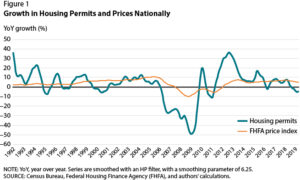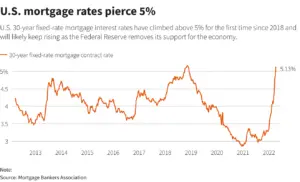If you think the housing market will collapse, you will probably try to profit from it. But how can you short real estate? We will tell you exactly how to short the housing market and profit if property prices collapse.
Is it possible to short the housing market or real estate?
Although it is impossible to short a single-family house, or individual houses like you would with stocks, it is still possible to get short exposure to profit from a housing market collapse.
How to short the housing market?
First, what you need to do is to identify exactly how to short the housing market, because there are several options available at your disposal.
Here are some of the options you may consider to short the housing market:
- REITs
- Real estate ETFs
- Stocks exposed to real estate
REITs
Short REITs
Shorting Reits can be one of the ways to profit from a housing market collapse. Since these stocks own vast portfolios of real estate, if the price of houses declines, the stock price will decline. You can short REITs, or you can trade options by either buying a put or selling a call.
Shorting REIT EFTs
Another option you can consider is to short REIT ETFs. There are plenty of different REIT ETFs that focus specifically in sometimes of real estate. You can either short REIT ETFs or consider buying puts or selling calls.
Inverse REIT ETFs
Additionally, there are inverse REIT ETFs which also offer short exposure to real estate. You may want to consider shorting individual REITs if you find some that are overleveraged or just buy an inverse REIT ETF.
You should also be aware that inverse ETFs are risky investment vehicles, especially those that are leveraged. So approach this type of trade carefully.
Here are some inverse REIT EFTs you may want to consider:
- ProShares Short Real Estate (REK)
- ProShares UltraShort Real Estate (SRS)
- Direxion Daily MSCI Real Estate Bear 3× Shares (DRV)
Real estate ETFs
There are also several REIT ETFs that have plenty of exposure to the housing market that you can short. You can either short these ETFs or buy puts or sell calls.
It is also possible to choose it according to the different types of real estate you are interested in.
Here are some of the main Real Estate ETFs you may consider shorting:
- Schwab US REIT ETF
- Real Estate Select Sector SPDR Fund
- iShares U.S. Real Estate ETF
- iShares Cohen & Steers REIT ETF
- iShares Core U.S. REIT ETF
- SPDR Dow Jones REIT ETF
- Fidelity MSCI Real Estate Index ETF
- Pacer Benchmark Data & Infrastructure Real Estate SCTR ETF
- JPMorgan BetaBuilders MSCI US REIT ETF
- iShares Residential and Multisector Real Estate ETF
- iShares Mortgage Real Estate ETF
- Global X SuperDividend REIT ETF
- Pacer Benchmark Industrial Real Estate SCTR ETF
Stocks exposed to real estate
If you want to choose individual stocks to short, there are also plenty of companies that would be suitable to short the real estate market. Some of these stocks include well-known players in the real estate industry but are not REITs, such as Zillow, Rocket Companies, and Redfin.
Here are some of the main types of stocks you can use to short the housing market:
- Companies with large real estate portfolios
- Lenders with large exposure to mortgages
- Companies exposed directly to real estate
Companies with large real estate portfolios
There is also an indirect way to short the housing market, and that is by shorting companies with large real estate portfolios. There are plenty of companies that invest heavily in real estate, even if that is not their main core.
These companies are suitable because a housing market crash will most likely lead them to impairments that would create losses for their shareholders.
Lenders with large exposure to mortgages
There are also several companies involved indirectly in the housing market since they act as lenders. These include banks and mortgage lenders. Here are some of the main stocks you can consider:
- Rocket Companies (RKT)
- Discover Financial Services (DFS)
Companies exposed directly to real estate
There are several companies that may not own a large real estate portfolio, but their operations are still directly dependent on how the housing market is doing. Some of these companies include:
- Real estate broker stocks
- Construction stocks
- Construction materials stocks
Real estate broker stocks
This type of company is directly dependent on the number of houses sold and the price at which they sell to earn their commission. Therefore an impending housing market crash could bring these stocks down in price.
Similar to what happened following the sub-prime housing collapse, the number of houses sold decreased. Additionally, the average price of properties also decreased, and real estate brokers' earnings and commissions were directly affected.

Construction stocks
Construction also tends to decline when house prices plunge, which makes construction stocks very attractive to short. After the financial crisis created by the sub-prime bubble, the number of new houses sold declined by nearly 75% in a matter of a few years.
Number of new houses sold in the United States from 1995 to 2021 (in thousands)

Source: Statista
Not only will most of these companies see declining revenues and earnings if the housing market collapses, but the inflationary environment we are in will also push their costs even higher.
Construction materials stocks
Finally, it is also expected that companies that supply construction companies with the materials they need will also lose their value. Based on what happened during the last financial crisis when the number of building permits declined significantly.

Is the US housing market cooling off?
At this point, there are no signs that the US housing market is cooling off yet because the average price of houses sold has continued to increase in the first quarter of 2020.
However, there are clear signs that house prices will most likely remain stable, or even decline going forward. The reason for this is that inflation is starting to rise very rapidly, and the Fed has to try to tame it, by raising interest rates.
The increase in interest rates has already pushed mortgage interest rates higher, which reached 5% recently.

Those looking to buy a property and finance it with a mortgage are now less likely to buy. This will lower the number of potential property buyers.
Additionally, the homeowners paying their mortgage with variable rates should soon feel the impact of the higher interest on the increased monthly mortgage payments
Although it is too early to say exactly what will happen, there seems to be enough data to point to a stabilization of housing prices and an eventual decline.
How to short the housing market in Australia?
To short the Australian housing market you need to look for Australian REITs or even real estate ETFs in the region. Additionally, you can look at some of the companies that are directly involved in real estate in the region, such as construction companies, lenders, and even construction materials companies.
Some of these companies include:
- Goodman Group
- Scentre Group Limited
- Dexus
- Stockland
- The GPT Group
You can also short some of these Australian housing ETFs:
- Vanguard Australian Property Securities Index ETF
- Vaneck Vectors Australian Property ETF
- State Street SPDR S&P/ASX 200 Listed Property Fund
How to short the housing market in the UK?
You can also short the UK housing market by looking at some of the stocks that are directly related to the property market in the UK.
Here are some of the largest UK stocks in the real estate sector:
- WP Carey Inc
- British Land
- Segro PLC
- Land Securities Group
- Unite Group
Here are some UK real estate ETFs you may also want to consider:
- iShares MSCI Target UK Real Estate ETF
- iShares UK Property UCITS ETF
How to short the housing market in Canada?
Following the same principles, you can look at Canadian REITs, and Canadian stocks with large exposure to real estate, such as:
- Altus Group
- FirstService
- Colliers International Group
- NorthWest Health Properties
- True North Commercial REIT
Here are some Canadian real estate ETFs you may also want to consider:
- BMO Equal Weight REITs Index ETF
- Vanguard FTSE Canadian Capped REIT Index ETF
- iShares S&P/TSX Capped REIT Index ETF
- CI First Asset Canadian REIT ETF
Conclusion
While there are some early signs that interest rates rising could push house prices down, it is still too early to tell what will happen. If you have a large exposure already to real estate you may want to consider taking a small short position as a hedge to your portfolio.
Just be aware of the risks of shorting the housing market, and avoid taking large speculative short positions.

